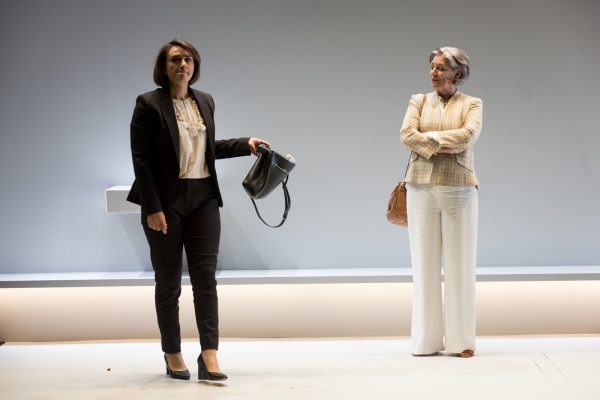Stop Girl review

There are lots of things to like about Stop Girl. It deals with interesting material, features great performances and engaging sound design. However, everything else from Stop Girl left me all but confused.
Sally Sara’s debut play, Stop Girl, is a psychological investigation into trauma, relationships, and what it means to be “normal”. We follow Suzie (Sheridan Harbridge), a successful war correspondent, currently on deployment to Afghanistan, in 2011. In the bare hotel room where Suzie reports from, we meet her uneasy colleague, Bec (Amber McMahon) and her Assistant, Atal (Mansoor Noor), native to the country, and empathic to the toil the war has brought to his people.
Soon however, Suzie is sent back home. Back to Sydney. Back to the hum-drum and groceries and her nagging mother, Marg (Toni Scanlan). While her return to a place free of bombs, machine guns and war would make anyone else happy, Suzie finds herself struggling with this normality. You get the sense that the type of high-strung individual to throw herself into a warzone as a journalist from the enemy state is not one for pantsuits and award galas. And so, while Suzie is haunted by her memories from the battlefield, she enters a new one – in her mind.
Anne-Louise Starks’ direction can, on the face, look uninvolved, with its bare set and, often, inelegant video projections, however, Starks’ strengths lie in her ability to create wholly authentic performances with her actors. Harbridge and Noor in particular are able to oscillate both dramatically and comedically, even in the same scene.

However, Stop Girl faces the same issues that many autobiographical texts face. Sara’s writing, while clearly drawn from real experiences, struggles to translate well on stage. Suzie’s dips into psychosis, while impactful, often aren’t very engaging, which sometimes comes down to the awkwardness of when these scenes appear in the play. The relationship between Suzie and her best friend Bec left a lot to be desired, Bec often just feeling like an AI for the main character to externalise into. And Atal, while given nice dramatic weight throughout the piece, is uncomfortably pitched as the Foreign Comic Relief who doesn’t understand Western Culture.
This is a shame as Stop Girl opens extremely promisingly, with terrific Sound Design and Music from Stefan Gregory and Hamed Sadeghi, and undeniable performances from the cast, including Psychologist (Deborah Galanos).
All in all, Stop Girl has a lot of good moments, but struggles to work for the full 100 minutes.
Alan Fang, 21 (He/Him)
___________________________________________________________________________
Walkley Award-winning journalist Sally Sara spent a year covering the Afghanistan war for the ABC before returning to Australia in 2012. Belvoir’s new play, Stop Girl, is Sara’s playwriting debut and a semi-autobiographical attempt to come to terms with the post-traumatic stress disorder that she experienced upon returning home, told through the lead character of Suzie (Sheridan Harbridge).

Although Sara’s story is certainly extraordinary, as a piece of theatre Stop Girl often fails to deliver. Design-wise, Robert Cousin’s set is unexciting and Jack Saltmiras and Susie Henderson’s video design is powerful but under-utilised.
Under Anne-Louise Sarks’ direction, Stop Girl starts strong with a tense opening in Afghanistan, but then loses momentum upon Suzie’s return home. Despite being a tidy 100 minutes, the pace often lags and would’ve been improved by cutting 20 minutes off the runtime.
The relationship between Suzie and her co-worker Bec (Amber McMahon) is given a lot of time but lacks interest. Much more compelling is the heart-wrenching dynamic between Suzie and Toni Scanlan’s Marg: a daughter who refuses to open up and a mother who is desperate to help. Mansoor Noor’s empathetic portrayal of Suzie’s Afghan coworker Atal grounds the story by reminding us that the suffering of war doesn’t go away just because we stop paying attention.
The play is most compelling when Harbridge is alone and we see the full extent of Suzie’s inner turmoil. Harbridge is brilliant as a woman tormented by PTSD but in denial about her symptoms and determined to keep it together. Stop Girl is at its best when Suzie is forced to wrestle with the contradictions of mental illness and hyper-productivity. Suzie cares more about her career than her own wellbeing, making her vulnerable when her deteriorating mental health leaves her unable to work but unwilling to open up and seek help.

Stop Girl is a provocative reflection of what can happen when we succumb to the pressure to achieve at all costs and ignore our mental health. In the age of the pandemic, where working from home is forcing the boundaries between our personal and professional lives to be blurred, the central message of Stop Girl — that your mental health is more important than any job — should not be ignored.
Jo Bradley, 22 (She/Her)
Belvoir St Theatre’s Stop Girl is playing at Belvoir St Theatre until April 25. Book your tickets here.

